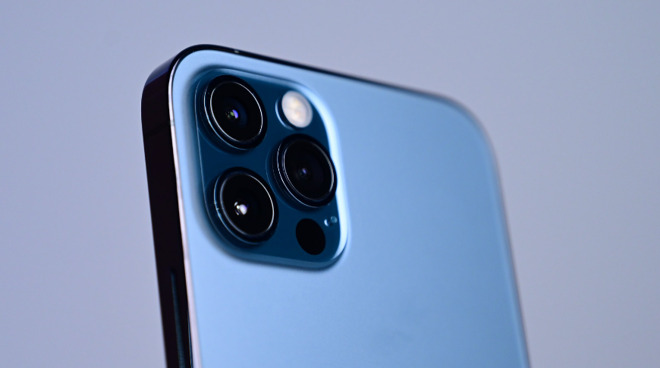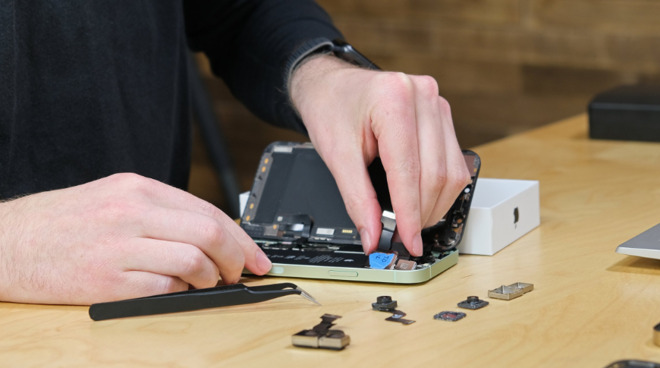iPhone 12 camera module cannot be replaced by third-party repair technicians
The iPhone 12 family introduces another repair obstacle that could limit third-party repairs even further with a new authorization step in changing out camera modules.

iPhone 12 camera system cannot be replaced without Apple technician software
Apple has increasingly designed its devices with restrictions on what can be replaced or repaired by non-certified technicians. The iPhone 12 introduces a new hurdle for repair facilities which could impact a user's ability to seek out third-party repair options.
Technicians coordinating with iFixit have discovered that the iPhone 12 camera requires a software authorization after a part swap in order to function properly. Previous iPhones could have their camera swapped easily with no additional steps. iFixit says that the camera and display are among some of the most frequent parts needing repair or replaced by users.
This software authorization can only be carried out by using a proprietary Apple app called System Configuration. The app is only available to official repair facilities like the Apple Store or Best Buy. Such a change could further impact the third-party repair market, private repairs, and parts scavenging and resale.
The iPhone 12 camera, when replaced without Apple's official software authorization, appears to work fine at launch, but begins to fail in regular use. iFixit notes that the camera failed to switch to ultra wide, would only respond in certain camera modes, and would become completely unresponsive.

A technician performing a camera swap (source: iFixit)
The issue was at first considered a bug, but has since been confirmed to be a point of practice suggested by Apple's repair manual. Requiring software authorization was previously reserved for repairs that could affect the security or safety of the device, and not the camera.
The camera is increasingly tied to the SoC for computational photography, which could indicate why Apple is forcing more precautions in software. iFixit is concerned that this is yet another attempt to force people away from repairing their own devices, and call on users to contact their legislators to force Apple's hand.
The right to repair movement is a complicated one, as they believe that any and all devices purchased by a consumer should be fully accessible, repairable, and have access easily sourced parts. The increasing complexity of hardware and software, and Apple's own control over the entire hardware stack and software experience get in the way of this belief.

iPhone 12 camera system cannot be replaced without Apple technician software
Apple has increasingly designed its devices with restrictions on what can be replaced or repaired by non-certified technicians. The iPhone 12 introduces a new hurdle for repair facilities which could impact a user's ability to seek out third-party repair options.
Technicians coordinating with iFixit have discovered that the iPhone 12 camera requires a software authorization after a part swap in order to function properly. Previous iPhones could have their camera swapped easily with no additional steps. iFixit says that the camera and display are among some of the most frequent parts needing repair or replaced by users.
This software authorization can only be carried out by using a proprietary Apple app called System Configuration. The app is only available to official repair facilities like the Apple Store or Best Buy. Such a change could further impact the third-party repair market, private repairs, and parts scavenging and resale.
The iPhone 12 camera, when replaced without Apple's official software authorization, appears to work fine at launch, but begins to fail in regular use. iFixit notes that the camera failed to switch to ultra wide, would only respond in certain camera modes, and would become completely unresponsive.

A technician performing a camera swap (source: iFixit)
The issue was at first considered a bug, but has since been confirmed to be a point of practice suggested by Apple's repair manual. Requiring software authorization was previously reserved for repairs that could affect the security or safety of the device, and not the camera.
The camera is increasingly tied to the SoC for computational photography, which could indicate why Apple is forcing more precautions in software. iFixit is concerned that this is yet another attempt to force people away from repairing their own devices, and call on users to contact their legislators to force Apple's hand.
The right to repair movement is a complicated one, as they believe that any and all devices purchased by a consumer should be fully accessible, repairable, and have access easily sourced parts. The increasing complexity of hardware and software, and Apple's own control over the entire hardware stack and software experience get in the way of this belief.

Comments
The broader movement is more about things like the creeping spread of locked in technology starting to affect things like the ability to repair a tractor - that didn't use to require specialized software, but now it does.
The issue here has nothing to do with a soldering iron. These devices will become increasingly difficult to repair by the average user (the same way televisions, automobiles, and countless other man-made objects over the history of civilization).
The question that I'm curious to know is whether the inoperability of a swapped camera module or Taptic Engine has to do with real security concerns (e.g.: the processor on the camera module could be used as a backdoor into the system if replaced with a purposely compromised component), a bug (i.e.: HW, firmware, and/or SW), or an artificial move by Apple to limit repairability.
Even if it's artificial, that doesn't mean it's necessarily a hostile move by Apple. For example, Apple could have seen excessive costs with people thinking they can do their own swaps just to have them not work properly and then use Apple Care to have Apple replace their non-functioning devices at a highly reduced cost, which Apple wouldn't know until they did forensics on the device in a teardown. That also doesn't mean that it's not a hostile move to force customers to reduce the longevity of their devices. Without internal, damning documents I'm not sure we'd could make any such deflation with certainty.
Don't give "AppleCar" any ideas
Let’s extend your argument a bit - cars are highly computerized now; how would you feel if Toyota suddenly said ‘the brake pads need to be calibrated with the computer’ or ‘the computer needs to measure the oil viscosity for the engine to run at optimal efficiency’ and suddenly required all service to be done at dealerships? I go to a local repair shop - the mechanics there are friendly and actually take the time to talk to me about the problem. It’s cheaper and more convenient for me to go there than the dealer. Now, if they suddenly had to start paying and extra $500 per year per mechanic per make to be ‘certified’ to work on those cars they would go out of business. Fortunately they don’t.
Apple removed USB chargers under the ruse of it being environmentally friendly, but enabling repairs on a phone has potentially a bigger impact than a charger. Beyond this, there are countless people who don’t live near an ‘authorized service center.’
You dismiss ‘right to repair,’ so my question is why do you defend any manufacturer’s right to prevent repairs?
Unless you have the skills AND the proper tools and training, just leave the repairs to Apple or Apple authorized repair places. It’s not worth the risk, or the cost if you fuck up.
I get the TouchID thing from the security standpoint, and I imagine there are similar safeguards in place for FaceID, and the new TouchID wake/sleep button(s), but I’m not sure, could there be some kind of security angle here? I’m guessing it would be a pretty long shot, but I reckon not outside the realm of possibility. Seems a bit extreme.
I get the TouchID thing from the security standpoint, and I imagine there are similar safeguards in place for FaceID, and the new TouchID wake/sleep button(s), but I’m not sure, could there be some kind of security angle here? I’m guessing it would be a pretty long shot, but I reckon not outside the realm of possibility. Seems a bit extreme.
They'd blame the person who fixed it. I've repaired all sorts of devices for people, iPhones, batteries, Macbooks, iMacs, PCs, projectors etc, and if something doesn't work, they don't go to the manufacturer, they come back to me. What on earth makes you think they'd go back to the manufacturer? Legally their contract for the repair is with me, not with the manufacturer. Going back to Apple over a third party repair is a straw man that you know is complete crap.